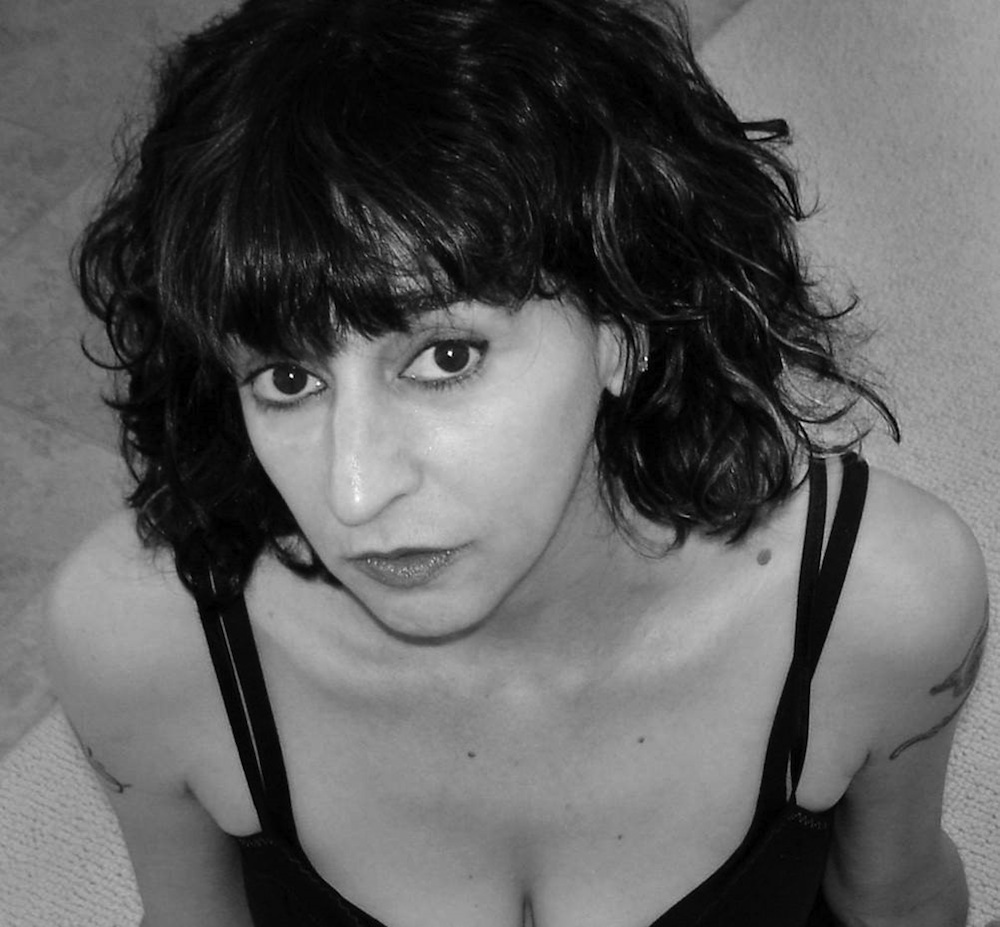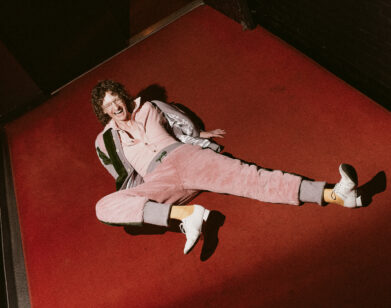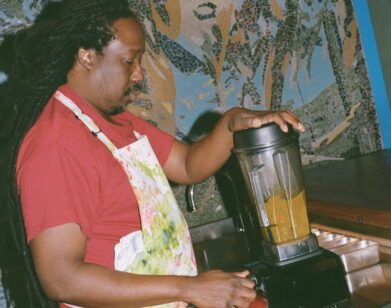The Life of a Writer

Out today, Bukowski in a Sundress (Penguin Books), Kim Addonizio’s new collection of essays, explores the author’s life as a writer. The 26 essays inside have provocative titles—”Penis by Penis,” “How to Be a Dirty, Dirty Whore,” “Children of the Corn”—and Addonizio doesn’t shy away from detailing one-night stands, her attempts to stop drinking, and the gritty details of taking care of her aging mother. In sum, they provide an honest depiction of one woman’s struggle against the banalities, degradations, and disappointments of everyday life while attempting to make art, offering implicit guidance for readers embarking on their own creative pursuits and a voyeuristic opportunity for those curious about what the “writing life” might entail.
In the particularly poignant “Flu Shot,” Addonizio must convince her mother, a former Wimbledon champion, to leave her assisted living community and get a flu shot at the drugstore. With wry humor (she suggests better names for assisted living communities: End of the Road, Senior Warehouse Outlet, and Soon Dead of Winter), and intimate detail, the Washington, D.C. native both subtly and more explicitly articulates the pain of watching her once-vital mother deteriorate. “What Writers Do All Day,” on the other hand, comforts aspiring writers that they are not alone in their procrastinations: “So maybe listing what other writers do to avoid writing can not only demystify the creative process for the layperson, but serve as useful advice for someone out there aspiring to become a published author,” Addonizio writes. Her list includes “Try on your shoes,” “Make lists of people who have died,” and “Have sex, with or without company.”
Addonizio’s essays chip away at the mysteries and assumed glamour of artistic production, generously providing insight into the experiences that both fuel and inhibit creation. The title of the collection itself is a joke, an epithetic a snarky critic gave Addonizio years ago. “I just decided to claim it,” Addonizio explains. “It’s really funny, and at the same time it was at my expense,” she continues. “I don’t feel that I am Bukowski in a sundress, [but] I thought it a great way to frame the collection. Everybody knows who Bukowski is, he has a certain reputation, and I thought it would be interesting for people to come to the book that way.”
Now in her early 60s, Addonizio has published six poetry collections, including Tell Me (2000), which was nominated for the National Book Award. Her other work includes two novels, two story collections, and two books on writing poetry. She has received fellowships from the National Endowment for the Arts and the Guggenheim Foundation, as well as two Pushcart Prizes. When we talk with her over the phone, she is soft-spoken and thoughtful, choosing her words with the precision one might expect of an accomplished poet. As in her work, she is open and willing to broach topics including the mechanics of writing, her literary influences, and her concerns about how her daughter will receive this new book.
ALINA COHEN: There’s a piece in your book called “I ♥ New York” about your love/hate relationship with New York and finding a mouse in your apartment.
KIM ADDONIZIO: I’ve been here for almost three years, and now I’m leaving. My book tour starts here when I get back from Italy and then I’m going back to the West Coast.
COHEN: What are you doing in Italy?
ADDONIZIO: I’m teaching a poetry retreat for two weeks. It’s a former monastery. We write and run around to all the little towns. It’s beautiful. It’s Italy. The food’s amazing.
COHEN: Many of the essays in the book look into the writing/teaching community, often touching on its more farcical elements. What are your thoughts on writing programs?
ADDONIZIO: Sometimes teaching is a love/hate thing. I do love teaching and have great students. I don’t do it at a university, which I’m really happy about. I don’t know how I’d feel if I were doing it in that setting. I get to somewhat pick my students, and a lot of them are serious. They’re not hobbyists. Sometimes they’re on their way to an MFA program, or they’ve gotten out of an MFA program and they want to keep writing and have a community. They’ll work with me and meet some people and get out into the world as writers.
COHEN: On your website, you make the point that classes aren’t therapy sessions, and you’re not a therapist.
ADDONIZIO: Anything can happen in a poetry workshop. People can weep. People get excited. I had a class once where it was a group of women, and we started talking about relationships and I kept trying to say, “Well, should we look at a poem now?” We might have been drinking wine as well. Then somebody goes, “You know what happened to me…” and we’d be off again. We never got to reading the poems that night because we ended up having this shit session for two and a half hours. But usually we do talk about the poems and it’s just a human experience. People are writing about all kinds of things. Part of it is people want to be seen; they want to have a place where they can talk about the things that happen to them and have somebody else recognize it. That’s something that sometimes the larger culture doesn’t give us, unless it’s reality TV. This is like reality TV for the soulful.
COHEN: That can veer into the confessional work, too. You write about how sometimes that form can be degraded.
ADDONIZIO: I started writing essays because people were asking me to write them for anthologies. It was a way to stretch out and say things I couldn’t in poems, or say them in a different way. “Confessional” is an interesting term. We live in such a confessional world right now. I’ve always thought of my work as art first and confessional second, if it even is confessional. I don’t hesitate to lie in a poem if it makes the poem better. I can change something entirely because it’s not me—it’s a persona. That’s also true of essays, but in a different way. The trick with writing essays is that I couldn’t lie. I’ve created myself as a character in a way in the essays, but everything in my book is true. You can’t remember every conversation, but everything is to the best of my memory. The challenge is figuring out what the story is and what to leave out or put in.
COHEN: Do you feel like there’s more “truth” in your poetry, even though you’re making stuff up?
ADDONIZIO: No, I think it’s all about the larger truth, whether you’re writing about yourself or politics or music or whatever it is. It’s just how you get there. Whatever that nut is that you’re trying to crack, which is usually some question you have about life, or some obsession.
COHEN: How much time and distance does it take to start writing about something?
ADDONIZIO: Sometimes not much at all. I will at least take notes right away. There are a couple of pieces in the book about taking care of my mother—taking her for a flu shot or the time she ended up in the psych ward. I’d spend some time with her and go home and take notes. I knew I would forget things. Sometimes I’ll go back and find these notes and a way to make them into something interesting.
COHEN: In the book, there are a few different threads about relationships—with your mother and daughter, with romantic partners, and with writing. How did you organize the collection?
ADDONIZIO: I wanted to mix up the pieces that are more strictly about writing, though they all intertwine. I think that’s partly because my writing life is my life and I experience life as a writer. I wanted to mix up the threads so someone reading the book can go back and forth and feel that it’s woven together and it’s not separate, because I don’t experience it separately.
COHEN: Do you think there’s a different audience for poetry and this type of book?
ADDONIZIO: I think poets and writers and people who are interested in writers and writing will definitely find things there—writing lessons couched in different ways. I think a lot of people are interested in writers’ lives and what that’s like. There’s a lot of mystique. I wanted to open that up and say, “This is what it’s like to be somebody who fell in love with writing and managed to achieve some success and then had all these interesting, weird, great, terrible experiences because of that.” That’s my path in life. I do feel that it’s more than a career. I’m so lucky to have a writing career and I feel like even if I weren’t getting published or were only getting published in some little places, I would still be writing. It’s what I love to do. It’s what puts me in the zone. A life without writing would make me miserable.
My brother Gary, who’s in the book, is an athlete. If he doesn’t get out on the tennis court or on his roller blades just about every day, he doesn’t feel right. He needs that. If I don’t write for a while, it’s the same way. I don’t feel like a complete person. I’m a colander—I get too many holes in me. I have enough of those already, and I don’t want any more.
COHEN: Was there anything off-limits when you were writing?
ADDONIZIO: I probably would not be putting some of that stuff out if my mother were still alive. She had dementia and was kind of out of it the last few years of her life. My father’s been dead for a long time. So “what will my parents think?” wasn’t an issue. Now it’s more about what my daughter will think. My daughter, [actress] Aya Cash, and I are really close, but she also has had a hard time with me in terms of some of the decisions I’ve made or some of the ways I’ve been in the world. I was not the apron-wearing, cookie-baking mom. I did make cookies sometimes, but I was not that kind of person. Ever. I think, in a way, it’s been great for her, because she’s become an artist and she’s now a successful actress. So she had that model, but we have had issues between us, so I’m still a little worried about her reading the book. The chapter I vetted with her was about our relationship. I didn’t show her the essay, but I told her about it. She was okay with it, so I think she’ll be okay with the book. She’s the only person who I really care about in terms of what someone thinks of me. That’s my own life, and that’s very different from what someone else thinks of me as a writer, or what a critic thinks, or what even an ordinary reader thinks. I don’t feel vulnerable in that way. I just try to be as truthful as possible and figure that this is who I am, and some people will like it, and some people will judge me, and some people, it won’t be their thing at all. So that’s why it’s dedicated to my tribe.
COHEN: Did writing these essays change the way you thought about certain parts of your life?
ADDONIZIO: Writing is part of the way I process my experience. It always helps to find the form for it and a way to say something, whether it’s my life or some other topic that I’m writing about and exploring. In one way it opens it up and helps you understand better and in another way it closes it down because you’ve written a version of the story that’s now your memory of the event. When I go back and remember something that happened, I may remember it only in the way I’ve written about it, and I’ll have forgotten what was there that I didn’t get down in writing.
It’s a way to try to trap part of life for a few moments as it rushes past, carrying us with it. It’s a way to hold on for a little while. I get to hold onto my mother in certain ways if I go back. Maybe other people can know something from it.
COHEN: You also switch point-of-view frequently throughout the book.
ADDONIZIO: Yes, in the “how-to” essays. The “you” becomes the second person for “me.” I actually kind of stole it from Lorrie Moore. I read some of her how-to pieces at one point and it helped to write certain stories. I’m not sure why that is. Maybe it creates a little distance. I’m writing another book of essays now, and one of them is called “How to Lose Your Brother,” about my brother’s death, and that just seems a way in to get to the things I needed to talk about.
COHEN: What other writers or works inspired you?
ADDONIZIO: One writer that I fell in love with and had never read [before] was Jo Ann Beard. Her terrific book The Boys of My Youth came out 15 or more years ago. There’s something about the way she writes that’s very fictional. There are real scenes in the way that memoir doesn’t always give you. She helped me unlock a way to get to what I needed to say.
I also really admire David Sedaris and Augusten Burroughs, the early work before he got all self-help and strange. Well, he was always strange. Their humor was an inspiration, too. A lot of the pieces are comic and I think reading those writers helped me develop my own comic voice.
COHEN: What else can you say about your next collection?
ADDONIZIO: I have maybe five pieces that are fairly far along. I’m waiting for more to happen to me, or I have to find some other kind of subject. I don’t know what that’s going to be, but that’s life. Hopefully it’s something beautiful and not too terrifying.
BUKOWSKI IN A SUNDRESS IS OUT NOW.






